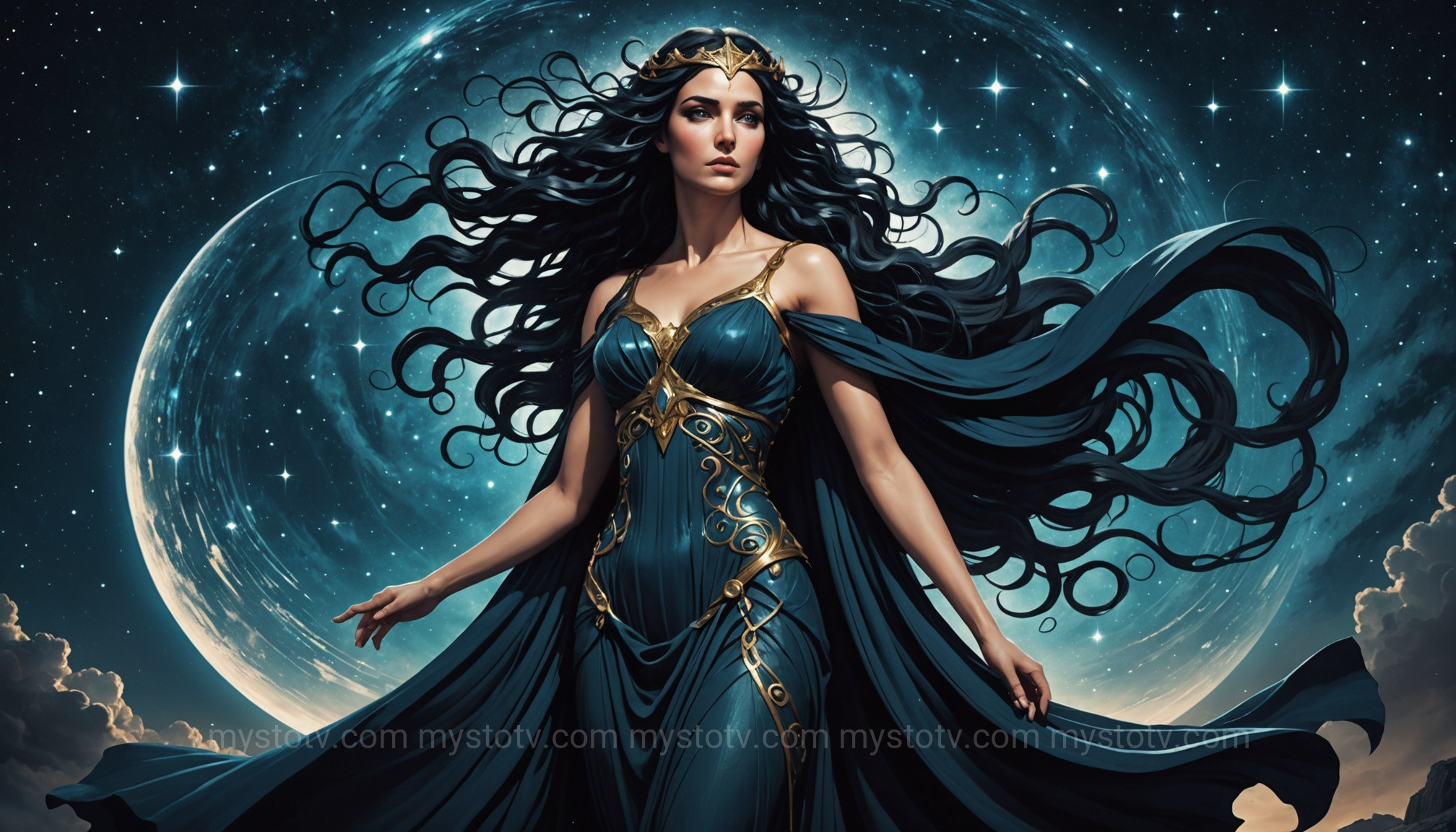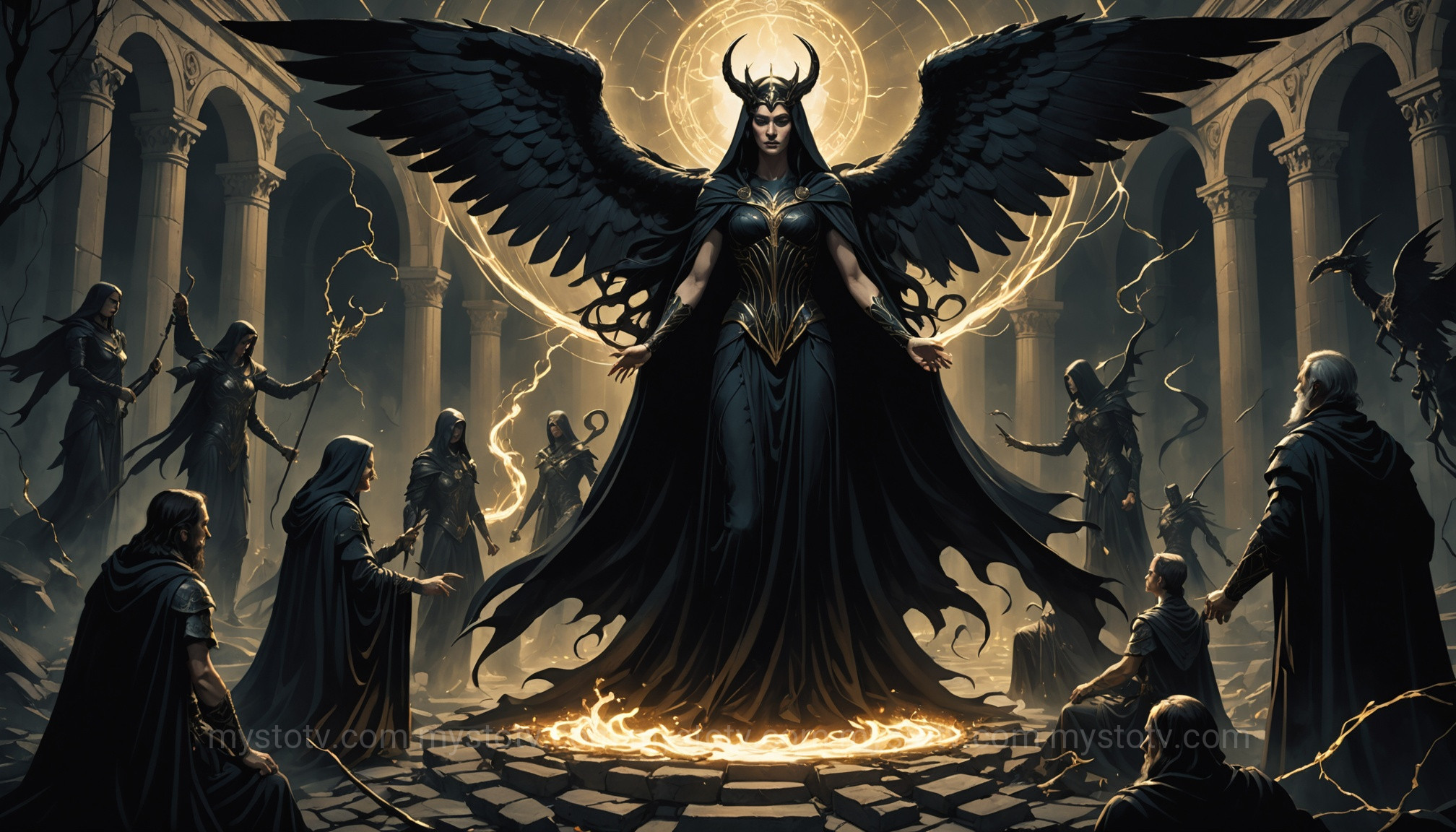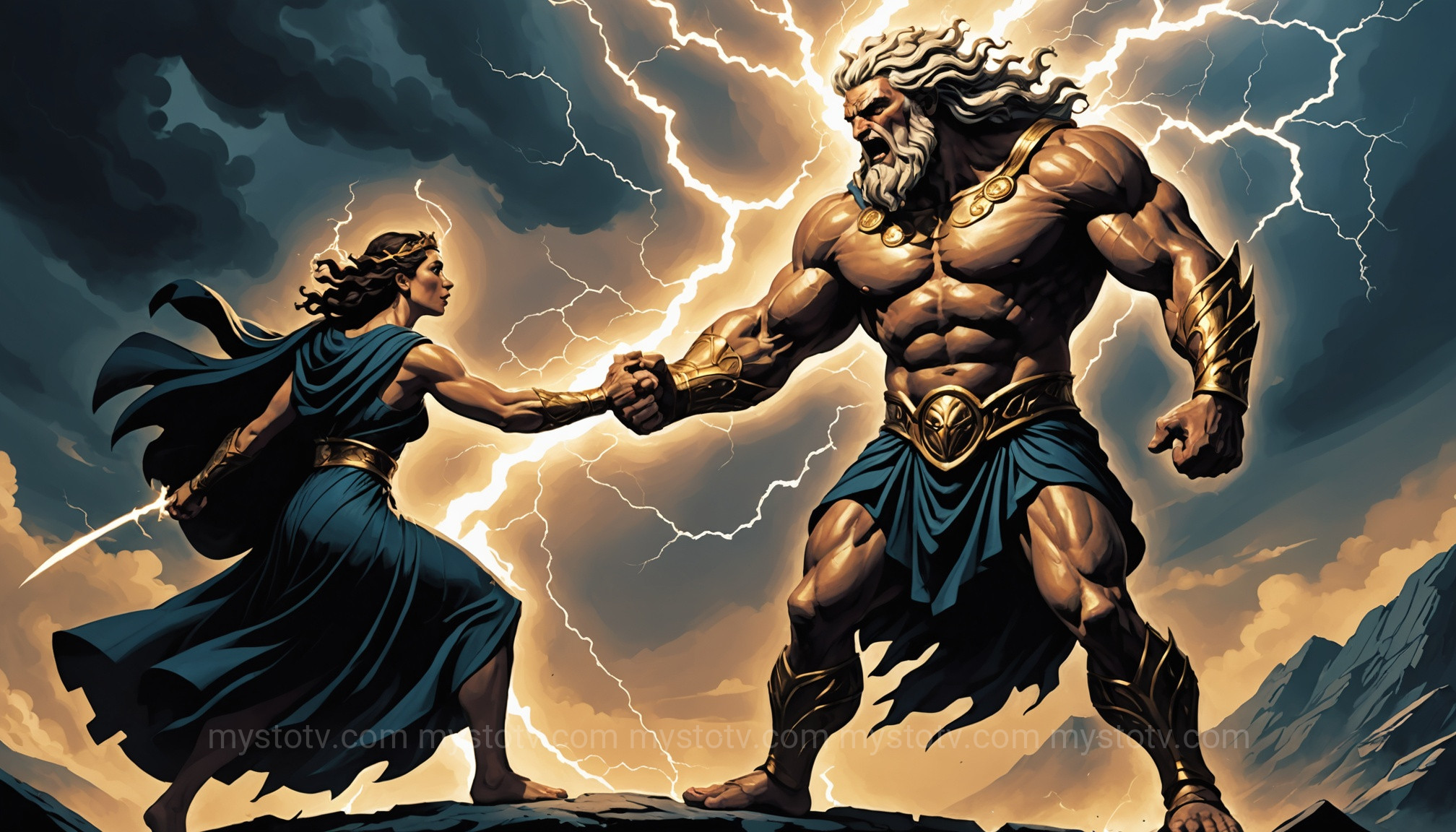I’ve always found a strange comfort in the deep, quiet hours of the night. Staring up at a sky dusted with stars, the world hushed and still, you get a palpable sense of something ancient and immense. It’s not an empty darkness, but a presence filled with potential and mystery. This feeling, I later learned, is the very essence of a primordial force the ancient Greeks personified. My fascination with that profound stillness led me to explore the lore behind the night itself, and specifically, the formidable Nyx greek goddess powers. She is far more than just a deity of darkness; she is one of the first-born, a Protogenos whose influence predates even Zeus and the Olympians. Understanding the true scope of the Nyx greek goddess powers is to understand the foundational magic of the cosmos itself.
Contents
- 1 Who is Nyx? Understanding the Primordial Origins of Her Greek Goddess Powers
- 2 A Deeper Look into the Spectrum of Nyx Greek Goddess Powers
- 3 The Unchallenged Authority: Why Zeus Feared the Nyx Greek Goddess Powers
- 4 The Enduring Night: Modern Resonance of the Nyx Greek Goddess Powers
- 5 Frequently Asked Questions About Nyx Greek Goddess Powers
- 6 Conclusion: The All-Encompassing Power of Night
- 7 References
Who is Nyx? Understanding the Primordial Origins of Her Greek Goddess Powers

Before the Titans and long before the Olympians ruled from their mountain peak, there were the Protogenoi—the first-born, primordial deities who were the literal embodiments of the universe's fundamental concepts. Nyx, the personification of Night, was one of these primal forces. According to Hesiod's Theogony, she emerged directly from Chaos, the yawning void at the beginning of everything. This origin is crucial to understanding the immense scope of the Nyx greek goddess powers. She isn’t a goddess *of* the night in the same way Apollo is the god of the sun; she *is* the Night.
Her power is not granted or derived; it is innate and elemental. She coexists with other primordial entities like Erebus (Darkness), Tartarus (the Pit), and Gaia (the Earth). As the Night, her domain is one of the fundamental states of the cosmos, a canvas upon which creation and destruction unfold. This primordial status places her in a unique position of authority and reverence. While the Olympians are powerful, they govern a world that already exists. Nyx, on the other hand, is part of the very fabric of that existence, giving her a deep, underlying influence that even the king of the gods had to respect.
A Deeper Look into the Spectrum of Nyx Greek Goddess Powers
The abilities attributed to Nyx are as vast and enigmatic as the night sky. They are not flashy or overt like Zeus's thunderbolts but are more subtle, pervasive, and arguably more fundamental. Analyzing the full spectrum of the Nyx greek goddess powers reveals her role as a cosmic matriarch whose influence touches everything from human destiny to the sleep of the gods.
The Ultimate Dominion: Control Over Night and Darkness
At its most basic level, Nyx's primary power is her absolute dominion over the night. She was believed to ride across the sky in a chariot, drawing the veil of darkness over the world and allowing the stars to reveal themselves. This is more than a simple day/night cycle; it's a display of cosmic authority. Her darkness is a realm of secrets, rest, and hidden truths. Within her domain, she can obscure vision, create illusions, and move unseen. This control over darkness and shadow is a core aspect of the Nyx greek goddess powers, making her realm a sanctuary for some and a place of terror for others. It is the power of potential, where anything can be born from the shadows.
The Mother of Destinies: Examining Nyx's Progeny and Their Powers

Perhaps the greatest testament to the Nyx greek goddess powers is her children. Hesiod's Theogony lists an astonishing number of powerful, abstract deities she bore, often without a partner. These children are not minor spirits; they are the very concepts that govern mortal and divine life. They include:
- Hypnos (Sleep) and Thanatos (Death): Her twin sons who hold power over every living being, including the gods. Sleep can subdue anyone, and Death is the inevitable end. Their authority stems directly from their mother, Night.
- The Moirai (The Fates): Clotho (the Spinner), Lachesis (the Allotter), and Atropos (the Unturnable). These three figures weave, measure, and cut the thread of life for every mortal and god, determining their destiny. That Destiny itself is born from Night speaks volumes about Nyx's fundamental role in the cosmic order.
- Nemesis (Retribution): The goddess of divine vengeance against hubris. She ensures that cosmic balance is maintained, punishing those who defy the natural order.
- Eris (Strife), Apate (Deceit), and Geras (Old Age): She also gave birth to the darker aspects of existence, representing the hardships and pains that are often faced in the "darkness" of life.
Her role as their mother means that these powerful forces are extensions of her domain. The concepts of Fate, Sleep, Death, and Retribution are all born from the Night. This makes her influence pervasive and inescapable.
Veiled Sight: The Prophetic and Oracular Nyx Greek Goddess Powers
Night is a time for dreams, visions, and revelations that are inaccessible in the bright, distracting light of day. Because of this, Nyx was associated with prophetic powers and ancient wisdom. While not a primary oracular deity like Apollo, her realm was considered a source of deep, hidden knowledge. The darkness she commands is not one of ignorance, but of introspection and mystery. It is believed that Nyx possessed knowledge from the beginning of creation, truths that predate the Olympians. This oracular aspect of the Nyx greek goddess powers reinforces her image as a keeper of primordial secrets, making her a figure of both wisdom and awe.
The Unchallenged Authority: Why Zeus Feared the Nyx Greek Goddess Powers
One of the most compelling pieces of evidence for the sheer magnitude of the Nyx greek goddess powers comes from Homer's *Iliad*. In a rare moment of vulnerability, the story is told of how Hera convinced Hypnos, son of Nyx, to put Zeus to sleep so she could interfere in the Trojan War. When Zeus awoke and discovered the deception, he was furious and sought to cast Hypnos from the heavens. Terrified, Hypnos fled to his mother for protection.

The text explicitly states that Zeus, "for all his anger," stopped his pursuit because he "stood in awe of doing anything to swift Night's displeasure." He feared angering Nyx. This is a staggering admission. Zeus, the undisputed king of the gods, who overthrew the Titans and commanded the respect of all Olympians, actively chose to back down rather than face the wrath of Nyx. This incident provides a clear analysis: Nyx's power is of a different, more ancient order. It suggests her authority is so fundamental that even the king of the gods recognized it as a boundary he should not cross. Her power isn't about physical might; it's about primal, inviolable authority. When Zeus considered striking her son, he wasn't just facing another goddess; he was contemplating a war with Night itself, a fight he knew he could not win.
The Enduring Night: Modern Resonance of the Nyx Greek Goddess Powers
The figure of Nyx has not faded with the ancient world. The enduring nature of the Nyx greek goddess powers continues to resonate in modern culture, symbolism, and spirituality. In contemporary media, she appears in literature, video games (like the popular title *Hades*, where she is a pivotal, respected character), and art, often depicted as a figure of immense power, wisdom, and maternal strength.
Symbolically, Nyx represents the unconscious mind, the source of creativity, and the mysteries of the universe. She embodies the idea that great potential lies in the unknown and that rest and introspection (the "night of the soul") are necessary for growth and rebirth. For many modern pagans and spiritual practitioners, she is a revered deity representing the cosmic womb and the powerful, creative potential of darkness. This modern interpretation shows that the core concepts behind the Nyx greek goddess powers—authority, mystery, creation, and an unyielding, quiet strength—remain as compelling today as they were thousands of years ago.
Frequently Asked Questions About Nyx Greek Goddess Powers
To provide further clarity, here are answers to some common questions about Nyx and her formidable abilities.
Was Nyx considered an evil goddess?
No, Nyx was not considered evil. She was seen as a powerful, neutral, and primordial force, much like nature itself. While some of her children represented dark concepts like Strife and Doom, she herself was respected and revered, not feared as a malevolent being. Her darkness was the necessary counterpart to light, a source of rest, mystery, and potential. The fear she inspired, especially in Zeus, was born of respect for her immense, ancient power, not malice on her part.
What is the difference between Nyx and Erebus?
Nyx (Night) and Erebus (Darkness) are both primordial deities who emerged from Chaos. They are often depicted as siblings and partners. The distinction is subtle: Erebus represents the deep, static darkness found in the empty voids of the underworld and the cosmos. Nyx represents the active, encompassing Night that covers the Earth each evening. Think of Erebus as the elemental substance of darkness, and Nyx as the personification of the nightly phenomenon and its mystical qualities. Together, they represent the complete power of darkness in the Greek cosmos.
How can one connect with the symbolism of Nyx's powers today?
Connecting with the symbolism of the Nyx greek goddess powers often involves embracing the positive aspects of night and darkness. This can be done through practices like meditation in the evening, dream journaling to explore the subconscious, or simply spending quiet time stargazing. It's about finding strength in stillness, appreciating the beauty of the dark, and recognizing that periods of rest and "darkness" are essential for personal growth and creativity, much like a seed germinates in the dark soil.
Conclusion: The All-Encompassing Power of Night
To explore the Nyx greek goddess powers is to journey back to the very dawn of creation. She is not simply a character in a myth; she is the embodiment of a fundamental cosmic principle. Her power lies not in overt displays of force, but in her unshakeable authority as a primordial being, her role as the mother of inescapable forces like Fate and Death, and the quiet, profound wisdom held within her nightly veil. The fact that even Zeus revered her authority solidifies her position as one of the most formidable figures in the entire Greek pantheon. The power of Night is the power of potential, mystery, and the deep, abiding order of the universe, and Nyx reigns over it all with a serene and absolute command.
References
- Hesiod. Theogony. Circa 700 BCE.
- Homer. The Iliad. Book 14, lines 249-261. Circa 8th Century BCE.
- Atsma, Aaron J. "NYX." Theoi Project, 2017. https://www.theoi.com/Protogenos/Nyx.html